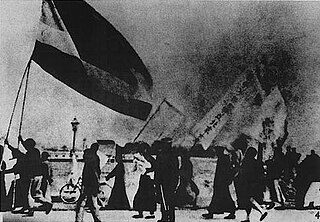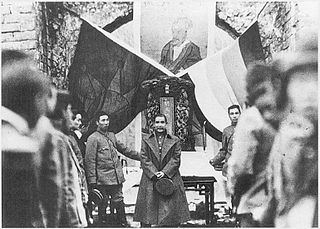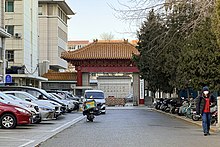Ethnic minorities in China are the non-Han population in the People's Republic of China (PRC).

Chinese nationalism is a form of nationalism in which asserts that the Chinese people are a nation and promotes the cultural and national unity of all Chinese people. According to Sun Yat-sen's philosophy in the Three Principles of the People, Chinese nationalism is evaluated as multi-ethnic nationalism, which should be distinguished from Han nationalism or local ethnic nationalism.
Sinicization, sinofication, sinification, or sinonization is the process by which non-Chinese societies or groups are acculturated or assimilated into Chinese culture, particularly the language, societal norms, culture, and ethnic identity of the Han Chinese—the largest ethnic group of China.

Han nationalism is a form of ethnic nationalism asserting ethnically Han people as the exclusive constituents of the Chinese nation. It is often in dialogue with other conceptions of Chinese nationalism, often mutually-exclusive or otherwise contradictory ones. Han people are the dominant ethnic group in both states claiming to represent the Chinese nation: the Republic of China and the People's Republic of China.

The United Front Work Department (UFWD) is a department of the Central Committee of the Chinese Communist Party (CCP) tasked with "united front work." It gathers intelligence on, manages relations with, and attempts to gain influence over elite individuals and organizations inside and outside mainland China, including in Hong Kong, Taiwan, and in other countries.

Xi Jinping is a Chinese politician who has been the general secretary of the Chinese Communist Party (CCP) and chairman of the Central Military Commission (CMC), and thus the paramount leader of China, since 2012. Xi has also been the president of the People's Republic of China (PRC) since 2013. He belongs to the fifth generation of Chinese leadership.

Shufu County, also transliterated from Uyghur as Konaxahar County or Konasheher County/Kona Sheher County, is a county in Kashgar Prefecture, Xinjiang Uyghur Autonomous Region, China. It contains an area of 3,513 km2 (1,356 sq mi). According to the 2002 census, it has a population of 360,000.
Pan Yue is a Chinese government official who is the current minister of the National Ethnic Affairs Commission and a deputy head of the United Front Work Department.

The Mongolian and Tibetan Affairs Commission (MTAC) was a ministry-level commission of the Executive Yuan in the Republic of China. It was disbanded on 15 September 2017.
A conquest dynasty in the history of China refers to a Chinese dynasty established by non-Han ethnicities which ruled parts or all of China proper, the traditional heartland of the Han people, and whose rulers may or may not have fully assimilated into the dominant Han culture.

Zhonghua minzu is a political term in modern Chinese nationalism related to the concepts of nation-building, ethnicity, and race in the Chinese nationality.

Xinjiang, officially the Xinjiang Uygur Autonomous Region, is an autonomous region of the People's Republic of China (PRC), located in the northwest of the country at the crossroads of Central Asia and East Asia. Being the largest province-level division of China by area and the 8th-largest country subdivision in the world, Xinjiang spans over 1.6 million square kilometres (620,000 sq mi) and has about 25 million inhabitants. Xinjiang borders the countries of Afghanistan, Kazakhstan, Kyrgyzstan, Mongolia, Pakistan, Russia, Tajikistan, and India. The rugged Karakoram, Kunlun and Tian Shan mountain ranges occupy much of Xinjiang's borders, as well as its western and southern regions. The Aksai Chin and Trans-Karakoram Tract regions are claimed by India but administered by China. Xinjiang also borders the Tibet Autonomous Region and the provinces of Gansu and Qinghai. The most well-known route of the historic Silk Road ran through the territory from the east to its northwestern border.

Chen Quanguo is a Chinese retired politician who was the Chinese Communist Party Committee Secretary of Tibet Autonomous Region from 2011 to 2016 and of the Xinjiang Uyghur Autonomous Region from 2016 to 2021, making him the only person to serve as the Party Secretary for both autonomous regions. Between 2017 and 2022, he was a member of the 19th Politburo of the Chinese Communist Party and was also Political Commissar of the Xinjiang Production and Construction Corps concurrently with his position as Xinjiang Party Secretary.

The Chinese Dream, also called the China Dream, is a term closely associated with Xi Jinping, the General Secretary of the Chinese Communist Party (CCP) and China's paramount leader. Xi began promoting the phrase as a slogan during a high-profile tour of an exhibit at the National Museum of China in November 2012, shortly after he became leader of the CCP. The exhibit at that time was called the "Road to National Rejuvenation". Xi said that the Chinese Dream is the "great rejuvenation of the Chinese nation".

Ismail Amat was a Chinese politician of Uyghur ethnicity who served as Chairman (Governor) of Xinjiang Uyghur Autonomous Region, State Councillor, Vice Chairman of the Standing Committee of the National People's Congress and Vice Chairman of the Chinese People's Political Consultative Conference (CPPCC).

Antireligious campaigns of the Chinese Communist Party (CCP) are a series of policies and practices, including the promotion of state atheism, coupled with its persecution of people with spiritual or religious beliefs, in the People's Republic of China. Antireligious campaigns were launched in 1949, after the Chinese Communist Revolution, and they continue to be waged against Buddhists, Christians, Muslims, and members of other religious communities in the 21st century. State campaigns against religion have escalated since Xi Jinping became Chinese Communist Party general secretary in 2012. For Christians, government decrees have mandated the widespread removal of crosses from churches, and in some cases, they have also mandated the destruction of houses of worship. In Tibet, similar decrees have mandated the destruction of Tibetan Buddhist monastic centers, sacred sites, and monastic residences; the denial of the Tibetans' right to freely access their cultural heritage; and the ongoing persecution of high Buddhist lamas as well as Buddhist nuns and monks. The persecution initiated in 1999 by Jiang Zemin against Falun Gong continues unabated with widespread surveillance, arbitrary detention, imprisonment, and torture. In Xinjiang, the CCP has arbitrarily detained more than a million Muslims in internment camps. In addition, the CCP's policies have included forced labor, suppression of Uyghur religious practices, political indoctrination, forced sterilization, forced contraception, and forced abortion.

The 2020 Inner Mongolia protests was a protest caused by a curriculum reform imposed on ethnic schools by China's Inner Mongolia Department of Education. The two-part reform replaces Mongolian with Standard Mandarin as the medium of instruction in three particular subjects and replaces three regional textbooks, printed in Mongolian script, by the nationally-unified textbook series edited by the Ministry of Education, written in Standard Mandarin. On a broader scale, the opposition to the curriculum change reflects racism in China and the decline of regional language education in China.
Han chauvinism is a political ideology that speaks out for the ethnic Han Chinese people and its uniqueness throughout human history. Han chauvinists believe that the current influence from the West has downgraded the development of China's own cultural customs, and in response, it has become instrumental in leading the increasingly traditionalist movement, which was launched in 2001. Participants come together both online and in person in cities across China to revitalize their vision of the authentic “Great Han” and corresponding “real China” through traditional ethnic dress and Confucian ritual.
Chen Xiaojiang is a Chinese editor and politician who is the Executive Deputy Head of the United Front Work Department of the Central Committee of the Chinese Communist Party since 2022. Previously, he served as Minister of the National Ethnic Affairs Commission; deputy director of the National Supervisory Commission, the highest anti-corruption agency of China; and deputy secretary of the Central Commission for Discipline Inspection, the party's internal disciplinary body.

The Shanghai Municipal Committee of the Chinese Communist Party, officially the Shanghai Municipal Committee of the Communist Party of China, is the municipal committee of the Chinese Communist Party (CCP) in Shanghai. The committee secretary is the highest ranking post in the city and outranks the mayor, who is generally the deputy secretary of the committee. The current secretary is Chen Jining, a member of the CCP Politburo, who replaced Li Qiang on 28 October 2022.














